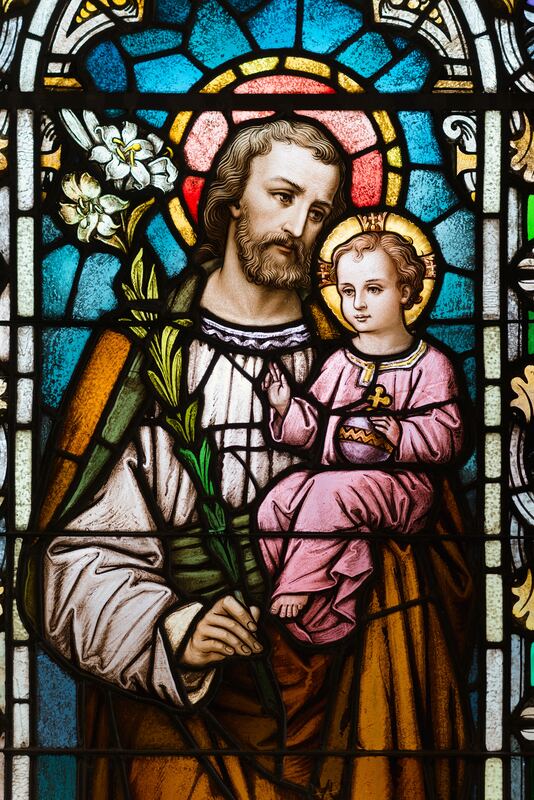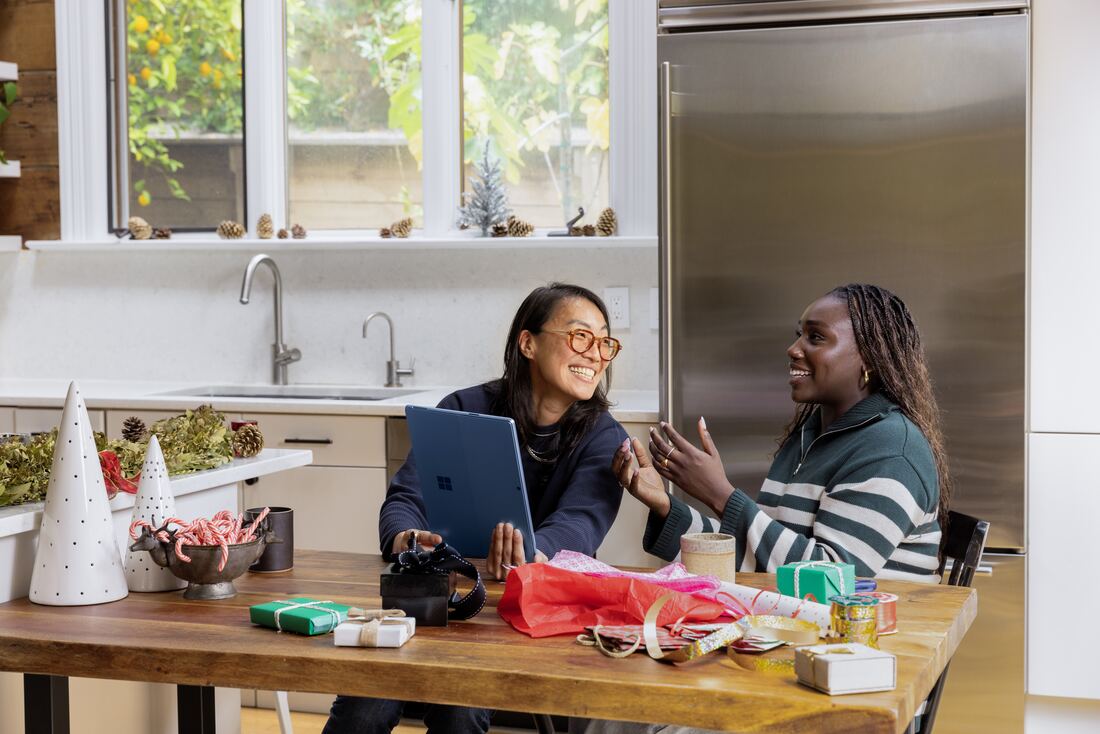Saying Yes to God
by Catherine Wiecher Brunell
Joseph's Yes
Let us focus on Joseph’s “yes.” His is unique in its place—it required Mary’s “yes,” but it also supported hers. This path, between the two, reminds me of what our best relationships require and can create. When we are brave enough to comingle, our response to the movements in our life intimately affect the people that we love. This means that we need to back each other up, but also that we help each other see what is possible. When Joseph said “yes,” he accepted the promise that Mary saw and affirmed that he would pursue it with her. He took part in God’s hope for his life but also relied on the faith of Mary’s hope.
On whom do you rely to see what is possible? Whose “yes” impacts your own?
Advent Reflection
The people we love the most are often the ones we push away with the same intensity. Of course, we don’t do this on purpose. We feel comfortable in these relationships and therefore when life demands more of us, we sometimes give less to those who are close.
Name three or four of these close people in your life. Like how Joseph affirmed Mary, where could these people use more of your support? Who in your life needs to know that you are with them 100%? Also, what does the need that they have create for you in your life?
Action Prompt
Joseph’s “yes” reminds us to partner with one another. When he agrees to continue with their marriage, he acts not only with trust in God, but also in Mary. Today, look for ways that you can partner with your loved ones. Look for ways you can trust them and act upon that trust. How does working in tandem affect your relationship with that person? How does it affect your understanding of God?
Prayer Prompt
Prayer is the practice of attending to that which is true. When we pray, whatever method we use, we notice our needs, our desires, and our relationships. Only by noticing what is within are we able to connect with what is beyond ourselves. As such, prayer is our participation in the deepening of the sacred.
Joseph taught us this when he said, “yes.”
I invite you to finish this prayer:
Partner God,
Trusting Responder,
Always Supporter,
Help me to be this to my loved ones.
They inspire me.
They need my support.
They lead me to you.
I am grateful for these people… (write or say their names as you hold them in prayer.)
Amen.
On whom do you rely to see what is possible? Whose “yes” impacts your own?
Advent Reflection
The people we love the most are often the ones we push away with the same intensity. Of course, we don’t do this on purpose. We feel comfortable in these relationships and therefore when life demands more of us, we sometimes give less to those who are close.
Name three or four of these close people in your life. Like how Joseph affirmed Mary, where could these people use more of your support? Who in your life needs to know that you are with them 100%? Also, what does the need that they have create for you in your life?
Action Prompt
Joseph’s “yes” reminds us to partner with one another. When he agrees to continue with their marriage, he acts not only with trust in God, but also in Mary. Today, look for ways that you can partner with your loved ones. Look for ways you can trust them and act upon that trust. How does working in tandem affect your relationship with that person? How does it affect your understanding of God?
Prayer Prompt
Prayer is the practice of attending to that which is true. When we pray, whatever method we use, we notice our needs, our desires, and our relationships. Only by noticing what is within are we able to connect with what is beyond ourselves. As such, prayer is our participation in the deepening of the sacred.
Joseph taught us this when he said, “yes.”
I invite you to finish this prayer:
Partner God,
Trusting Responder,
Always Supporter,
Help me to be this to my loved ones.
They inspire me.
They need my support.
They lead me to you.
I am grateful for these people… (write or say their names as you hold them in prayer.)
Amen.
Mary's Yes
Mary’s “yes” is most profound to me in the way that it changed her life. It is believable, even without God’s request, that she and Joseph would have become parents. Because of her “yes” though, she became not only a mother, but the mother of Jesus. An ordinary life was made sacred by way of an invitation that she affirmed. Her life was deepened but the shape of it remained mostly the same: Like any mother, she was still needed by the infant in the middle of the night, chased the toddler with the hopes of a nap soon to come, and turned her life towards her child’s. The difference is that her attention turned toward the child who was Jesus. When Mary said “yes,” she welcomed God into the content of her already given life.
So it is with our lives. When we say “yes,” God is most often inviting us to what is already within our capacity—inviting us to see our ordinary roles as sacred. Like Mary, can we accept the deepening of the lives that we have already been given? Can we say “yes” and let life be sacred?
Advent Reflection
Imagine the scene of Mary’s “yes.” What details do you see and how do these affect your understanding of her response? We know her answer was “yes,” but what was beneath it? What thoughts do you think she had? What knee-jerk feelings were formed and how did they become part of her response? What do you imagine the conversation in her mind was as she formed her response?
Need help imagining the scene? Follow this link to see a variety of images of the Annunciation.
Action Prompt
We are told that Mary did not run or hide when the angel came to her. Somehow, she was present to the experience and the request. While I do imagine that she had many feelings in that moment, they did not usurp her attention or her ability to respond. This presence of mind inspires me. I think of her “yes,” and I long for the kind of presence she might have had in the encounter.
Today, think about some common feelings that distract you in your encounters. Maybe it is fear that you can’t do something or anger that you feel you must. Maybe it is resentment that another needs you or guilt that you do not want to be needed.
As you go about your day, notice these feelings and then practice your way back to what is actually at hand. You can do this by writing, “yes” on a piece of paper to remind you visually of Mary’s response. Or perhaps you would rather choose a word to repeat or mental image to use when the feelings you’ve named surface. Choose a simple action that will help you refocus on what is actually before you.
At the end of the day, ask yourself, “When I was present today, what happened?”
Prayer Prompt
Prayer is the practice of attending to that which is true. When we pray, whatever method we use, we notice our needs, our desires, and our relationships. Only by noticing what is within are we able to connect with what is beyond ourselves. As such, prayer is our participation in the deepening of the sacred.
Mary taught us this when she said, “yes.”
I invite you to finish this prayer:
God, you are my ever-patient creator.
You are my abundant invitation.
Help me to respond to the layers of my life with a Yes you have heard before. Help me echo the Yes that Mary gave in these places of my life…
Our Yes
Like the expectant Mary and Joseph, we all have a piece of God to bring into this world. We have been created and as such, the seeds of our creative possibilities remain within our core. How do we harvest these? How do we ready them? How do we audaciously trust that we have a “yes” to issue as well?
One way to begin is to put ourselves into the story of God.
Picture the manger scene. We can imagine the animals and even the angels. We can hear the cry of the newborn baby and feel the relief of his parents. We can see the star bright in the sky. But can we find ourselves within its rays? Where do we fit into this familiar miracle? Christ was born unto us. What does this mean? As we look for our place in the scene, we will ready ourselves to respond more deeply to it.
Advent Reflection
Use a few of these questions to prompt your reflection:
- If Mary’s “yes” to God led to Joseph’s, where do they both lead you?
- What do you imagine that God is growing in your life right now?
- Where in your life do you need Christ to enter the most?
- What is God’s invitation to you? How is it unbelievable? How is actually very possible?
- What will you co-create with God this year?
- What will change in your life when you say “yes”? What will stay the same?
Action Prompt
Think of an area that is not your strength. Perhaps it is a physical activity like running or a social skill like starting a conversation. Choose something that is difficult for you but imagine it as doable. Imagine that it is an invitation to which you can respond, “Yes!”
At the end of the day, look back on the activity and your response to it. What was your experience? How can this experience impact your faith? What is doable in your life because of your faith?
Prayer Prompt
Prayer is the practice of attending to that which true. When we pray, whatever method we use, we notice our needs, our desires, and our relationships more. Only by noticing what is within are we able to connect with that which is beyond ourselves. As such, prayer is our participation in the deepening of the sacred.
We practice this when we say, “yes.”
I invite you to finish this prayer:
Today, Yes is my prayer.
It is my Amen.
My Barukh atah Adonai. (1)
My Peace Be with You.
Yes is my belief in all things possible.
God, hear my yes as I listen to yours… (write or imagine how God is affirming you—saying yes to you and the needs of your life.)
(1) Beginning phrase of all Hebrew blessings. Translation, “Blessed are You, LORD”
Catherine Wiecher Brunell is a pastoral minister of the everyday. Her life's work is about finding meaning in ordinary things by teaching and practicing faith. She has a master's degree in pastoral ministry from Boston College. She lives in Natick, Massachusetts, with her four children and husband.
Originally published in Inspiration During Advent.
Images from Unsplash and Pixabay. Used under license/with permission.
Originally published in Inspiration During Advent.
Images from Unsplash and Pixabay. Used under license/with permission.



